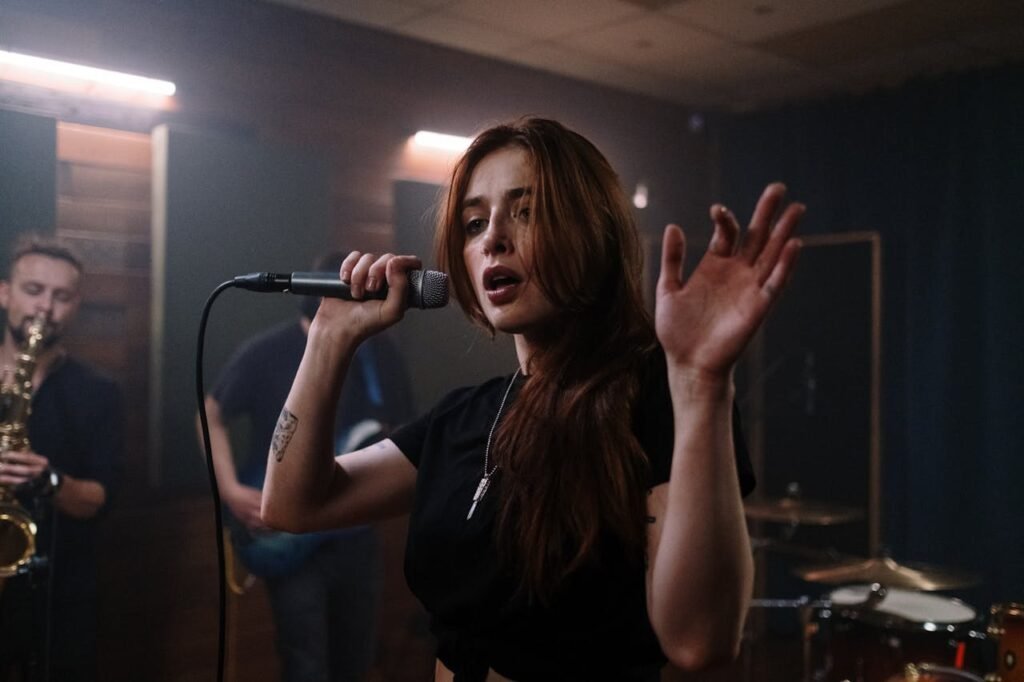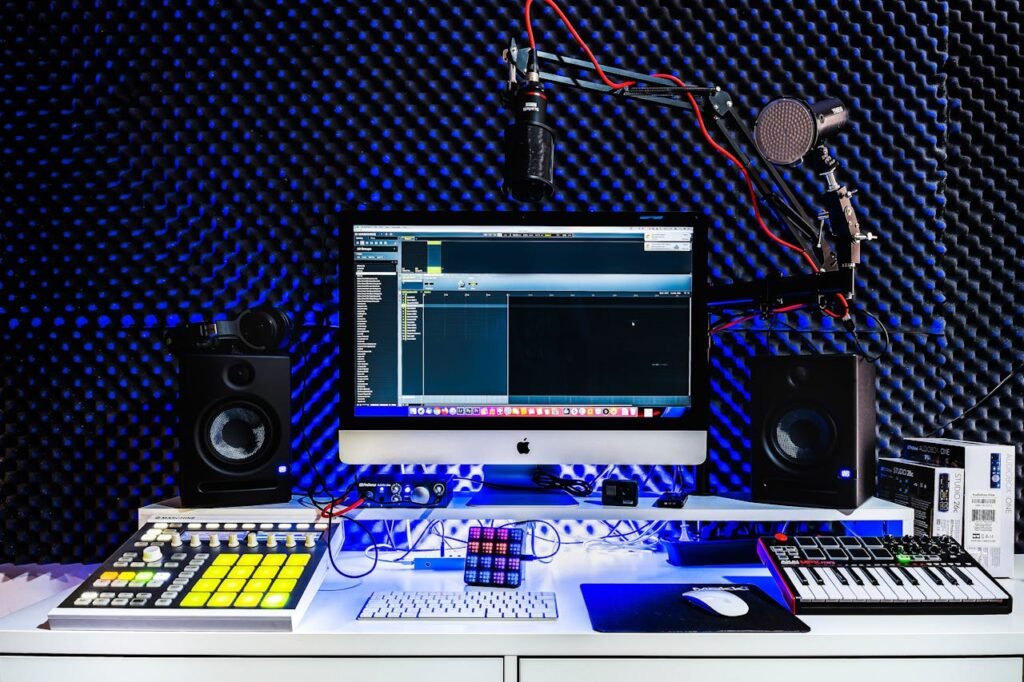Welcome, music enthusiasts! Today, I’m excited to take you on a journey through 33 captivating statistics about the use of artificial intelligence in music. I was personally surprised at some of these numbers!
Whether you’re a musician, a producer, or simply a lover of good tunes, you’ll discover how AI is shaping the future of music in ways you might not have imagined. The presence of AI in music is more widespread than I initially realized!
AI in Music Key Takeaways:
- AI-generated music is becoming increasingly popular in various contexts, from commercials to film scores.
- A significant number of music producers are already using AI tools in their music production workflow, while many others are planning to try using AI tools soon.
- As AI continues to evolve, it is expected to have an even greater impact on the music industry, from creating new and unique sounds to transforming the way music is distributed and consumed.
Please enjoy my list of statistics!
Table of Contents
Here are the 33 AI in Music Stats!
I grouped the statistics into themes to clarify music producers’ views on AI in music production. This included their overall sentiment, usage of AI tools, concerns, usefulness of certain AI tools, and future outlook. This organization helped me understand the diverse opinions in the industry, from optimism to skepticism, in a more structured way.
General Sentiment Towards AI in Music Production
Only 17.3% of surveyed producers think negatively about using AI in music production.
47.9% are neutral towards using AI in music production.
34.8% feel positive about integrating AI in music production.
Current Use of AI Tools in Music Production Workflow
36.8% of surveyed music producers already use AI tools in their music production workflow.
63.2% of those surveyed were not currently using AI tools in their music production workflow.
Plans to Use AI Tools
30.1% of music producers are planning to try using AI tools soon.
15.7% of surveyed producers had already tried AI tools and were disappointed by their quality.
Concerns About AI in Music Production
29.7% are worried AI music production tools may lead to less creativity and originality.
24% are concerned about ethical and legal issues with AI-generated music.
18.6% are concerned AI tools could put music producers out of work.
21.5% are not worried at all about AI in the context of music.
Usefulness of AI Music Tools
28.66% of surveyed producers find AI mixing and mastering tools the most useful.
22.27% did not find any AI music tools particularly useful.
Around 10-11% find AI music generators, AI drum sequencing tools, and AI Sound Design/Synthesis tools useful.
9.01% found AI Voice Changing tools useful.
Interest in Future AI Music Production Tools
25.76% are interested in more AI-powered plugins for mixing and mastering.
18.71% want AI-assisted Digital Audio Workstations (DAWs).
8.75% are not at all interested in AI tools for their workflow.
Opinions on AI Music Generators
33.6% think AI music generators could be useful for inspiration only.
19% believe AI music generators hold no value.
18% think non-musicians could find AI music generators helpful for generating placeholder music.
15% believe AI music generators could be beneficial for educational purposes.
Beliefs About AI Replicating Human Music Production
56.8% believe AI music generators could replicate humans to some extent, but not fully.
16.3% believe AI generators could fully replicate human music production.
26.9% don’t believe AI will ever be able to replicate human production.
Opinions on Copyright for AI-Created Music
36.8% believe AI-generated music should be public domain.
28.6% believe the individual using the AI tool should own the copyright.
22.7% believe copyright should involve artists whose music the AI was trained on.
2.7% believe the developer of the AI tool should own the copyright.
Future Impact of AI Music Tools
53.6% believe AI music tools will be useful for specific aspects of production in the future.
33% believe AI will replace most (but not all) music production tools in the future.
8.2% responded that AI won’t replace all current music production tools but will facilitate and enhance human production skills.
40% of music producers report an interest in exploring AI technologies for enhancing live performances.
These statistics provide insights into music producers’ attitudes towards AI in music production, including their concerns, current usage, and future expectations. Let me give props where props are due. My Sources are from a survey done by my friends at BedRoomProducers blog and ifpi.org.

The Impact of AI in Music Creation
AI-Generated Music
One of the most significant impacts of AI in music creation is the ability to generate music automatically. AI-driven music creation platforms like AIVA and Amper Music use deep learning algorithms to analyze and understand patterns in existing music and generate new compositions.
These platforms can create music in various genres, including classical, pop, and electronic.
AI-generated music has been used in various applications, including video games, commercials, and film soundtracks. However, there is still some debate over whether AI-generated music can match the creativity and emotional depth of human composers.
Influence on Music Production
AI has also had an impact on music production. AI-driven tools like LANDR and Ozone use machine learning algorithms to analyze and enhance music tracks.
These tools can automatically master and polish tracks, making them sound more professional.
AI has also influenced the way music is produced. For example, some producers use AI to analyze data on popular music trends and create music that is more likely to be successful. However, there is still some debate over whether AI-driven music production can replace the creativity and intuition of human producers.

Future Trends with AI and Music
Advancements in AI Musical Abilities
As AI continues to evolve and become more sophisticated, its role in the music industry is expected to expand.
One of the most significant advancements in AI musical abilities is the development of AI-generated music. AI-generated music has the potential to revolutionize the music industry by creating new and unique compositions that were previously impossible.
In addition, AI can be used to analyze existing music to identify patterns and trends, which can help musicians and producers create better music. AI can also be used to improve the quality of sound recordings by removing noise and enhancing the overall quality of the sound.
AI in Music Conclusion
As we draw the curtains on our exploration of AI’s impact on music, one thing becomes abundantly clear: the melodic journey continues to evolve with every beat and note.
The 33 AI in music insights we’ve uncovered are reminders of the incredible impact AI is having on the music industry. Whether you’re a budding musician crafting your next hit or a devoted fan enjoying your favorite tunes, it’s impossible to ignore the influence of AI on the music we love.
As we continue on this journey, let’s remember to stay curious, open-minded, and, above all, human. While technology may play an increasingly important role in our musical landscape, it’s our passion, emotion, and connection to the music that truly brings it to life.

![You are currently viewing 33 Remarkable Statistics about AI in Music Production [2024]](https://itsyourlifejourney.com/wp-content/uploads/2024/03/AI-in-Music-Statistics.jpg)
![Read more about the article AI Pattern Trading: Best Innovative AI Tech in [2024]](https://itsyourlifejourney.com/wp-content/uploads/2024/02/AI-Pattern-Trading-300x188.jpg)

![Read more about the article Freed AI: Automate Your Documentation in [2024]](https://itsyourlifejourney.com/wp-content/uploads/2024/01/Freed-AI-300x188.jpg)
Pingback: 3 Best Free AI Band Name Generators in [2024] - It's Your Life Journey